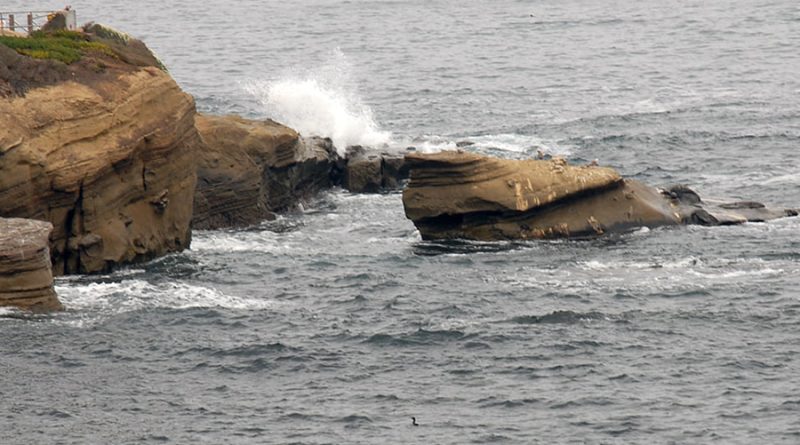Biden and the Democrats Are Addressing the Climate Crisis, but
Southern California has received a lot of rain since the beginning of the year. In the last two years The Los Angeles area has received 52.46 inches of rain. It’s the El Niño-Southern Oscillation driving the wet weather into our usually dry climate.
The climate prediction center of the National Weather Service says we will be getting more rain before summer sets in. That’s good news for a state that has been laboring in the midst of a long-term drought.
The United States Geological Survey (USCG) has been monitoring and trying to mitigate the destructive effects of climate change. On this page the USGS points out the relationship between climate change and the extended drought felt throughout the western United States. The agency has this on their website: “Climate change has further altered the natural pattern of droughts, making them more frequent, longer, and more severe. Since 2000, the western United States is experiencing some of the driest conditions on record. The southwestern U.S., in particular, is going through an unprecedented period of extreme drought. This will have lasting impacts on the environment and those who rely on it.”
All of us rely on the environment in one way or another.
— Flash flood warnings flashed across our TV screens and smart phones —
The Yale Program on Climate Communications, which is the “gold standard” of polling about climate change, said most people don’t know as much about the climate crisis than they assume they do. We get bombarded with news about the Israel-Gaza war, the Russia-Ukraine War, the ex-president’s legal issues — his New York City case is selecting jurors as I type — news about the coming elections, It’s all important front burner concerns, but we are losing sight of the number one existential threat to all of humanity — the climate crisis. It has a burning stove all of its own.
Democrats, including the California delegation, will point to the two most historic climate crisis-related pieces of legislation that were passed by congress and signed by President Biden: the Inflation Reduction Act (IRA) and the Bipartisan Infrastructure Act.
To see all the benefits of the Inflation Reduction Act click on this link to the Department of Energy. Or, for the less technical version, this document from the Biden-Harris White House. Probably the biggest advantage from this act is Environmental Justice It’s the first item listed. It states: “For far too long, many communities across the United States have borne the brunt of toxic pollution, endured underinvestment in critical infrastructure, and suffered disproportionately from the impacts of climate change.”
Everything in the Inflation Reduction Ac is directed at cutting our carbon foot print. There are investments in “advancing and Deploying American-Made Clean Energy Technologies.” and “Financing and Expediting Development of Clean Energy Technologies.”
When we go deeper into the bill we find plans to “Preserving and Protecting the Nation’s Lands and Waters for Climate Mitigation and Resilience.”
There is an “Ocean Climate Action Plan” and the bill directs “$2.6 billion to support coastal Resilience and conservation, restoration, and protection of coastal and marine habitat and resources, including fisheries.”

Between the two bills America has invested in plans that address the climate crisis while investing in American workers with home-grown green technologies, including green agriculture plans to preserve more of our forests, including assistance to underserved forest landowners for climate mitigation and forest resilience practices. We, as a nation are making some very ambitious plans to deal with the climate crisis.
The issue that no one wants to talk about is what to do with the Runit Dome. It’s a depository for all the nuclear waste created by the U.S. nuclear tests in the area of the Marshall Islands. According to the Department of Energy, the sand and soil around the dome is more contaminated than the dome and its radioactive waste — which was just mixed with concrete when the U.S. government thought to “dispose” of the waste by using one of the A-bomb craters to bury the radioactive waste.
As yet no one in government is addressing the creeping catastrophe of the Runit Dome. In 2019 the Los Angeles Times had this expansive article on the growing disaster. I envy their resources. Apparently the U.S. government is declining to do anything about it because “the Tomb,” as locals call it, is on Marshall Islands land and therefore that government’s responsibility. But the Marshall Islanders (Marshallese) didn’t create the problem, didn’t blow up 67 nuclear bombs and then create another hazard when the U.S. government decided a big hole in the ground covered with cement was an adequate way to dispose of the nuclear waste created by the U.S. government. Not just nuclear waste, but debris from chemical and biological weapons testing as well.
The Inflation Reduction Act and the Bipartisan Infrastructure Act are great steps in the right direction, but we will need to continue expanding on those ambitious plans and maybe — just maybe — we can slow down this climate disaster and the mass extinction that is occurring right now.

Tim Forkes started as a writer on a small alternative newspaper in Milwaukee called the Crazy Shepherd. Writing about entertainment, he had the opportunity to speak with many people in show business, from the very famous to the people struggling to find an audience. In 1992 Tim moved to San Diego, CA and pursued other interests, but remained a freelance writer. Upon arrival in Southern California he was struck by how the elected government officials and business were so intertwined, far more so than he had witnessed in Wisconsin. His interest in entertainment began to wane and the business of politics took its place. He had always been interested in politics, his mother had been a Democratic Party official in Milwaukee, WI, so he sat down to dinner with many of Wisconsin’s greatest political names of the 20th Century: William Proxmire and Clem Zablocki chief among them. As a Marine Corps veteran, Tim has a great interest in veteran affairs, primarily as they relate to the men and women serving and their families. As far as Tim is concerned, the military-industrial complex has enough support. How the men and women who serve are treated is reprehensible, while in the military and especially once they become veterans. Tim would like to help change that.

